March 2019 Newsletter
Welcome to the March 2019 issue of the Global Washington newsletter.
IN THIS ISSUE
- Letter from our Executive Director
- Issue Brief: What Will It Take to End Child Marriage?
- Organization Profile: World Concern – Ending child marriage begins by keeping girls in school
- Changemaker: Perla Vázquez, Deputy Program Director at the Seattle International Foundation CAMY Fund
- Welcome New Members
- GlobalWA Member Events
- Career Center
- GlobalWA Events
- GiveBIG 2019
Letter from our Executive Director
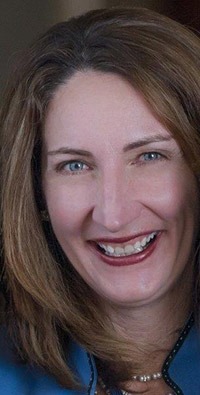
International Women’s Day was last Friday, March 8, and in honor of the day Global Washington announced our new Women of the World program. This learning network of female philanthropists who care about global issues is an expansion of the Women of the World annual breakfast, which the Seattle International Foundation transitioned to Global Washington in 2018. More information about Women of the World will be available on the GlobalWA website shortly.
Also in honor of International Women’s Day, Global Washington is elevating the issue of ending child marriage and discussing effective interventions from our GlobalWA member organizations. When a girl is married at an early age, this often means she stops attending school, is more vulnerable to abuse, and faces greater health risks, especially if she becomes pregnant. Fortunately, the practice of early marriage is in decline. In order to eliminate this practice altogether by 2030, as outlined in the targets for Sustainable Development Goal 5 (“Gender Equality”), the global community will need to accelerate efforts to promote the rights and well-being of girls and young women.
Learn more about promising efforts in our profile of an incredibly inspiring Changemaker, Perla Vázquez, who is the deputy program director at the Seattle International Foundation’s Central America & Mexico Youth Fund (CAMY Fund). We also explore how World Concern’s scholarships in Bangladesh help girls stay in school and reduce the pressure on their families to see them marry at a young age. By working with communities to change norms around early marriage, our members are catalyzing transformational change that helps break long-standing cycles of poverty. Our event on March 27, Vowing to End Child Marriage by 2030, will continue this conversation, with speakers from World Concern, UNICEF USA, and CAMY Fund. I hope you can join us!

Kristen Dailey
Executive Director
Issue Brief
What Will It Take to End Child Marriage?
By Joanne Lu
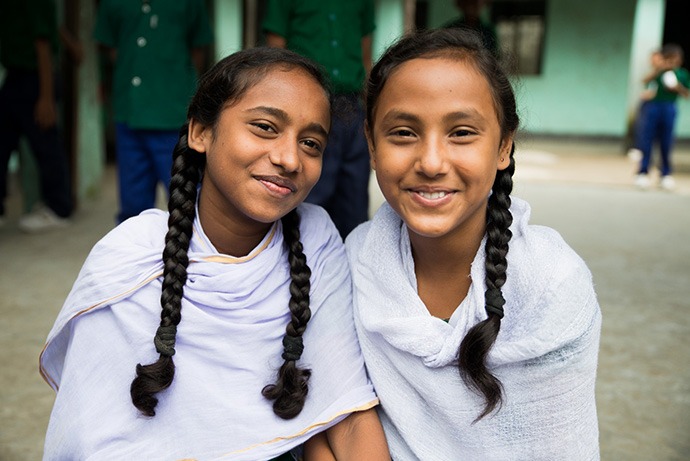
Two girls pose for a photo outside their school in Dhaka, Bangladesh.
Photo by Taylor Jashinsky for World Concern.
Imagine being a 9-year-old girl, with dreams of becoming a teacher one day. You love school and learning and spending time with your friends. But at home, your father is talking about finding you a husband – not when you’re in your twenties, educated and working. No, now.
Child marriage is a violation of international human rights law. Yet around the world, about 650 million of the women and girls alive today were married before their 18th birthday, according to the United Nations Children’s Fund (UNICEF). By 2030, it’s estimated that more than 150 million girls will become child brides. The problem affects young boys as well, but to a much lesser degree than girls. In 2015, UNICEF estimated that about 18 percent of children married before age 18 are boys, while the rest are girls.
No doubt there has been progress. Concerted efforts to eliminate the practice have successfully averted about 25 million child marriages over the last decade: Whereas one in four women and girls were married as children 10 years ago, that ratio has dropped to one in five. But UNICEF warns that progress is not nearly fast enough to eliminate the practice by 2030, as laid out in UN’s Sustainable Development Goal (SDG) 5. In fact, the agency says that the rate of progress needs to be 12 times faster than in the past decade to meet the target, and right now, not a single region in the world is on track to do so.
While South Asia has improved the most, UNICEF reports that girls in Latin America and the Caribbean are still just as likely to become child brides as their mothers were. Meanwhile, early and forced marriage is actually expected to increase in Sub-Saharan Africa, because the population is growing rapidly, but progress in eliminating the practice has been slowest in the world. Currently, 38 percent of girls in Sub-Saharan Africa become child brides.
But it’s not just a practice in the developing world. In the U.S., child marriage under certain circumstances, like parental or judicial consent, was legal in every state until last year, when New Jersey and Delaware completely banned marriage under age 18.
Why does forcing children into early marriages occurs on such a large scale around the world? According to Girls Not Brides, the reasons vary from community to community, but some of the main drivers of the practice are gender inequality, tradition, poverty and insecurity. In many contexts where the practice is common, girls are seen as economic burdens on their family. Marriage, therefore, is a way to pass that burden onto another man. In cultures where the bride’s family pays the groom a dowry, they often pay less when the bride is young and uneducated. Plan International also notes that certain cultures consider younger wives to be more obedient, while some families think marriage will protect their girls from sexual violence.
But that is not true, according to Plan, as girls married early are “more likely to experience violence, abuse and forced sexual relations.” They also face a higher risk of sexually transmitted infections, including HIV, because usually they are less educated about safe sex, have less say about how to practice sex and are subjected to unprotected sex with husbands who often have prior sexual partners. But perhaps the most dangerous consequence of early marriage is early pregnancy. According to Girls Not Brides, the biggest killer of girls aged 15 to 19 globally is complications in pregnancy and childbirth. Perhaps that’s why SDG 5 identifies child marriage as a harmful practice on par with female genital mutilation.
In addition to serious health consequence, child marriage also forces children to drop out of school, take on adult responsibilities, spend their time on unpaid household work and give up their dreams. This in turn often keeps them trapped in a cycle of poverty.
But the problems aren’t strictly confined to child marriage. UNICEF points out that cohabitation – when a girl isn’t legally married to a man but is his caregiver and lives “in union” with him as if they’re married – can often be more problematic. The lack of legal status as a wife can undermine a girl’s rights to inheritance, citizenship and social recognition.
All these risks contribute to girls being among the world’s most vulnerable populations, who must be protected by laws. But as Plan International points out, it’s not enough for legislators to set the legal age of marriage to 18. The laws must also be enforced and awareness of them spread. Youth activists in some communities are using mediums like radio, music and theater to teach about children’s rights.
But many of the leading interventions to protect children from early and forced marriage center around education. UNICEF reports that in many countries, every year of secondary education reduces the likelihood that a child gets married before age 18 by five percentage points or more. Staying in school allows girls to not only increase their earning potential, but it often also provides more safety and security, better health and more agency to make their own life decisions. Unfortunately, in many of the communities where child marriage is prevalent, sending a child to school – particularly a girl – is not an expense that many families prioritize. Often, it’s more economical to just marry off their daughter.
That’s why World Concern offers scholarships to girls who are at risk of child marriage, effectively taking the financial decision off the table for families. CARE also includes empowerment activities in their girls’ education programs to help girls build confidence and leadership skills. And in many rural communities, girls have no educated and working role models, so CARE builds houses for female teachers to live in these communities that otherwise have no female teachers.
Some organizations also focus on increasing girls’ (and boys’) access to youth-friendly sexual and reproductive health services. These services included sexual education and family planning, which teach girls’ and their communities about children’s rights and puts them in a better position to decide if and when to have children.
But some advocates say that in order to fully eradicate the practice, the conversation around child marriage has to change.
“I find the term ‘child marriage’ an oxymoron, because you cannot have ‘child’ and ‘marriage’ in the same phrase,” Jemimah Njuki, a senior program officer at Canada’s International Development Research Centre, said in a recent interview with BRIGHT Magazine. “We’re talking about the sexual abuse of children.”
Njuki says that sanitizing the practice by “couch[ing it] within the respectable institution of marriage” is undermining efforts to eliminate it.
“If we change the conversation to one of child sex abuse, then we focus on the man who is doing it, as well as the cultural beliefs that condone it,” she says.
* * *
The following Global Washington members are working to end early marriage through their work.
More than one in four girls in India is married before the legal age of 18 years, thereby subjecting them to a lifetime of ill health, neglect and violence. Breakthrough today reaches over 400,000 adolescents across five states in India to help change this bleak situation. The organization does this by building the agency of girls to believe in themselves and to demand their rights to health and education. Breakthrough also works with girls’ families and communities to ensure they value girls and have faith in their potential, so that girls can thrive. While this is a slow process, results are already visible – for example, in its program areas in Jharkhand, Breakthrough has been able to increase the age at which girls are married by 1.7 years. Learn more at https://inbreakthrough.org/focus-area/early-marriage/
Founded in 1945 with the creation of the CARE Package®, CARE is a leading humanitarian organization working in 93 countries to fight global poverty. Women and girls are at the heart of CARE’s community-based efforts to improve education and health, create economic opportunity, respond to emergencies and confront hunger. Through CARE programs such as A Future She Deserves, CARE is working to prevent and eliminate child, early and forced marriages with a goal of reaching over 1 million girls and their families. CARE places a special focus on addressing child marriage in crisis zones, where girls are especially vulnerable. Girls in these contexts, such as those from Syrian refugee families, are often married off for income, legal status or perceived protection. CARE works together with community leaders and partners to change social norms so that vulnerable girls and young women can achieve their aspirations.
Under the umbrella of its Center for Women’s Land Rights, Landesa’s Girls Project in West Bengal, India, aimed to improve the social and economic status of girls, and thereby reduce their many vulnerabilities in the short and long-term, including early marriage. Around the world, land is a source of wealth, status, and opportunity. But rights to land are not equitably distributed to all. By increasing girls’ and communities’ understanding of girls’ land-related rights and helping girls to use land to create assets, girls can demonstrate their value, gain some control over their futures, and are better equipped with the skills and understanding necessary to exercise their land rights as adults.
Mercy Corps works to empower and educate girls and delay early marriage through initiatives like girl groups and accelerated educational opportunities. In Niger, which has the highest child marriage rate in the world (3 in 4 girls marry before their 18th birthday), Mercy Corps has established safe spaces in 20 rural communities for over 3,000 out-of-school adolescent girls. Here girls can discuss topics like family planning, health and nutrition, and education. As a result, 93% of girls enrolled could name at least one benefit to delaying early pregnancy. Also in Niger, Mercy Corps implemented a two-year accelerated program that helps girls finish primary school and re-enter and complete high school. After the first two years, 90% of students graduated and 95% of community members and parents reported that it was important for girls to postpone marriage so they could finish their education.
Oxfam America is a global organization working to right the wrongs of poverty, hunger, and injustice. As one of 19 members of the international Oxfam confederation, Oxfam America works with people in more than 90 countries to create lasting solutions. Oxfam believes that young people, especially girls, have the right to decide freely if and when to marry as well as to make informed choices about their sexual and reproductive health and rights, in a supportive environment. Through its “Creating Spaces” programme to take action on violence against women and girls, and its work with partners through the “More Than Brides Alliance,” Oxfam works to reduce child marriage and its adverse effects on young women and girls in Bangladesh, India, Indonesia, Pakistan, Nepal, the Philippines, Malawi, Niger, and Mali. Learn more at https://www.oxfam.ca/project/creating-spaces and https://morethanbrides.org.
Sahar creates opportunities in Afghanistan that empower and inspire children and their families to build peaceful, thriving communities. It achieves this by building schools and designing educational programs that address key barriers that keep girls from accessing and completing their education. In Northern Afghanistan, for example, an estimated 57% of girls are married before the legal age of 16. While early education is encouraged, girls are often forced into early marriage around age 12 or 13, and drop out of school. Sahar’s Early Marriage Prevention Program inspires girls to continue their education and empowers them to become leaders in their community. It also equips them to advocate for themselves by increasing their knowledge of potential educational opportunities and an understanding of their legal rights. Each year, Sahar reaches 500 girls directly, and more than 2,000 community members.
Seattle International Foundation’s Central America & Mexico Youth Fund (The CAMY Fund)
The CAMY Fund works to address and prevent child marriage and early unions in Latin America and the Caribbean through a multipronged approach that includes advocacy, convening, grant making, and research. The CAMY Fund is a leading actor on the issue in the region, and tirelessly promotes keeping girls and young women at the center of the discussions that affect them directly, and consciousness of the cultural, social and political context that makes the practice of child marriage manifest in this diverse region with large impoverished, rural and indigenous communities. The CAMY Fund is a program of the Seattle International Foundation, and its child marriage initiative receives funding support from the Ford Foundation, Novo Foundation and Summit Foundation. Read more here: http://unionestempranas.org/en/lac-initiative/
750 million girls and women today were married before their 18th birthday. This practice is a fundamental violation of human rights and causes girls to lose valuable economic, educational, and social opportunities. If current trends continue, the number of girls and women married as children will reach nearly one billion before 2030. UNICEF works with governments to sustainably address the root causes of child marriage by strengthening systems and working to end harmful behavioral practices. In 2015, the global community made a strong commitment to ending this problem by endorsing UN SDG 5.3, which aims to “eliminate all harmful practices, such as child, early and forced marriages and female genital mutilation.” This target has the power to influence a number of other goals on the agenda, including those around clean water, poverty, nutrition, health, education, economic grown and the reduction of inequality.
World Concern is a Christian global relief and development organization that partners with isolated and impoverished communities beyond the end of the road to give them access to clean water, sustainable food options, healthcare, education, and other necessities of life. By first listening to leaders within a community, World Concern helps it determine primary needs and goals, empowering families to own the work, which brings transformation that lasts. One of the vital aspects of World Concern’s work is the effort to change cultural norms regarding child marriage. By providing scholarships for girls to attend school and building awareness of the dangers of child marriage in communities, World Concern is helping young women gain a brighter future. This breaks the cycle of poverty within a family and benefits the entire community. World Concern operates transformational community development programs in Haiti, Kenya, South Sudan, Somalia, Chad, Uganda, DRC, Sri Lanka, Nepal, Bangladesh, Laos, Myanmar, Vietnam, Yemen, and Syria.
The World Justice Project is an independent, multidisciplinary organization working to advance the rule of law around the world. Effective rule of law reduces corruption, combats poverty and disease, and protects people from injustices large and small. It is the foundation for communities of justice, opportunity, and peace—underpinning development, accountable government, and respect for fundamental rights. In recent years, significant strides have been made in advancing legislation to prevent child marriage. Trinidad and Tobago, Guatemala, and El Salvador have all amended a number of marriage acts and loopholes that had outlawed underage marriage. Malawi—a country that consistently ranks among the world’s top twenty nations with the highest prevalence of child marriage—removed a provision that permitted child marriage if the parents consented.
Organization Profile
World Concern – Ending child marriage begins by keeping girls in school
By Joanne Lu
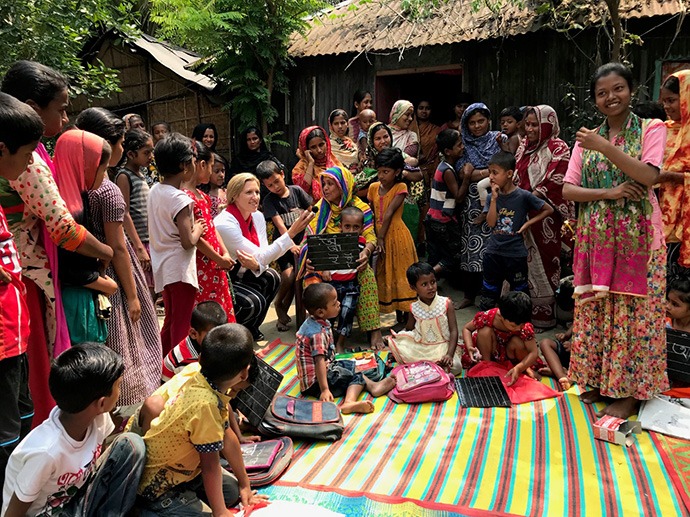
Salma (far right) presents to her preschool class (2018). Photo provided by World Concern.
Salma is a preschool teacher in rural Bangladesh. She’s a high-school graduate and plans to continue her education in college. In a country where an estimated 45 percent of girls drop out of secondary school, Salma is a big deal.
But just four years ago, at 14 years of age, Salma was among millions of girls who live in absolute fear of being forced into marriage, likely to an older man. As a girl from a poor family in Bangladesh, which has the fourth highest rate of child marriage in the world, according to UNICEF, and the second highest number of child brides – nearly 4.5 million in 2017 – Salma was staring down the barrel of child marriage.
That is, until she received a scholarship from World Concern to stay in school. The UN Population Fund says that girls who have a secondary education are up to six times less likely to be married off before their 18th birthday. That’s why World Concern believes the solution is to keep girls in school, especially when their families can’t afford it.
The scholarship is just one component of World Concern’s holistic approach to what they call “transformational development” in the world’s poorest and hardest-to-reach places. Over its 65-year history, World Concern has refined the ways it addresses not just physical and economic needs, but emotional and spiritual, as well – taking into account the whole person.
“We believe that every human being is created in the image of God,” says Cathy Herholdt, World Concern’s senior communications director. “Every human being deserves to have their basic needs met and have an abundant life. That faith is what drives us; it’s why we do what we do.”
That belief also guides their transformational development approach, in which communities take charge of their own development. Instead of a top-down approach, World Concern works alongside communities to identify their greatest needs, their greatest assets and how they want to improve. It’s also why 95 percent of World Concern’s staff are nationals from the 15 countries in which they work across South and Southeast Asia, East Africa, Haiti, and the Middle East.
Herholdt says that over the 30 years that World Concern has worked in Bangladesh, they’ve seen how child marriage is a “scourge” that’s keeps people trapped in a cycle of poverty and causes extreme physical and emotional harm to young girls.
“Literally, they’re terrified,” Herholdt says about the girls she has interviewed.
Often the girls’ mothers were themselves married as children, and they talk about how it took all their choice and freedom away. They don’t want that life for their daughters, but in a male-dominated society, where spending even $50 to $100 a year to send a child to school is too costly for a family earning a dollar a day, parents often feel like they have no choice.
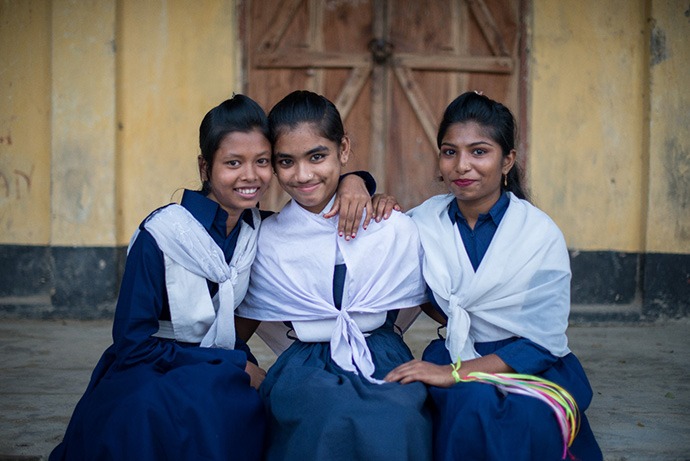
Salma (left), poses with other scholarship recipients (2015). Photo provided by World Concern.
World Concern’s scholarships give girls and families the choice to keep their daughters in school until they’re past the age of forced marriage and to break the cycle of poverty by setting them up for better jobs and futures.
The effects are spreading beyond families into entire communities. For example, World Concern is helping women’s groups (or “federations,” as they call themselves) learn about the impacts of child marriage, why it’s better for girls to be in school, how to prevent child marriage and how to spread that message.
These women are banding together to form a powerful voice and actually effect change from within their communities. When they hear that a family is considering marrying off their young daughter, if just one of them goes to confront the father, it often doesn’t go well and can even be dangerous. But when they all go together to come alongside the family and share why it’s a bad idea and that there are better options, they say they’re often successful in stopping the child marriage.
“It’s coming from within the community,” says Herholdt. “It’s a very powerful thing to see.”
As daughters watch their mothers step up to protect them and each other, girls are also finding ways to replicate that empowerment through youth health and hygiene clubs and other group support systems. Boys are also watching their sisters excel in school, while their mothers run businesses and become community leaders. This, says Herholdt, is how culture changes holistically.
At the moment, World Concern’s child marriage program is primarily in Bangladesh as well as a few other countries, like Kenya, Chad and Somalia, where the issue is prevalent. But Herholdt says they’re excited to continue expanding their transformational development work into new areas that are the hardest places right now, including Syria, Yemen, and South Sudan.
“We’re moving away from one-off sectors and focusing on how and where we can have greater impact with our holistic approach,” says Herholdt. “We’re letting that drive who we are and how we do our work.”
Changemaker
Perla Vázquez, Deputy Program Director at the Seattle International Foundation CAMY Fund
By Arielle Dreher
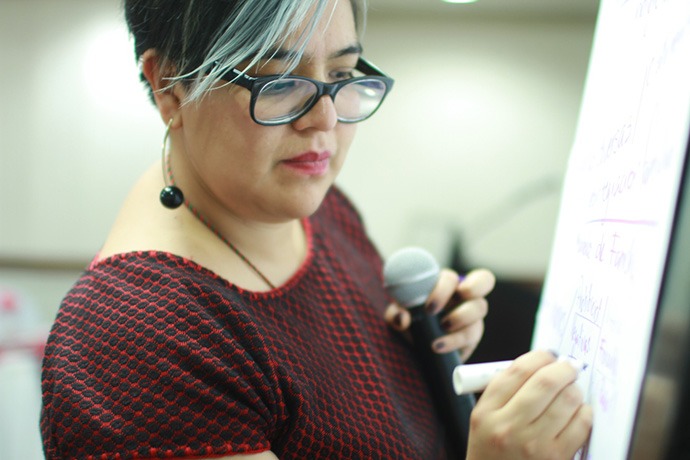
Perla Vázquez is no stranger to activism or feminism. She recalls being a 15-year-old activist in her hometown, advocating for teens’ rights and later for women’s rights in her own community. Vázquez, born and raised in Mexico City, where she still lives, took her passions and made them her career.
“I think it’s very important that every person—and every woman—can decide for themselves who they share their lives with,” Vázquez says.
This sentiment is, indeed, at the heart of her work. As a young activist, she was a director at ELIGE, a feminist youth organization in Mexico, which advocates for sexual and reproductive rights for young people. Vázquez studied political science at the Autonomous Metropolitan University and has her master’s degree in international cooperation for development from the Mora Institute.
Vázquez worked as a regional specialist in the Americas for Sexual and Reproductive Health and Rights Plan International, and she is a current board member on FRIDA, a young feminist fund.
Vázquez currently works for the Seattle International Foundation’s Central America & Mexico Youth Fund (The CAMY Fund). She joined the Seattle International Foundation team in 2017 as a project manager for The CAMY Fund’s Child Marriage Initiative, and she is now the CAMY Fund’s deputy program director.
ELIGE, which Vázquez still gets to work with today in her role at CAMY, advocates for national reforms needed for youth in Mexico, particularly in regards to reproductive health. For example, in the public health sector, only women who are of the legal marrying age by the country’s standards are allowed to receive access to things like condoms, Vázquez said. This precludes young women, who are not yet 18 years old from receiving reproductive health services they want or need. ELIGE works to change these types of laws nationally.
The Seattle International Foundation started the CAMY Fund in 2014. It has since invested close to $3 million in over 30 non-profits and youth collectives in Central America and Mexico that are working on sexual and reproductive rights, as well as women’s rights, including secondary school retention and ending early, forced and child marriages. Culturally, these topics can be difficult to tackle in Central America and Mexico, Vázquez says, particularly ending early marriages.
The CAMY model includes funding, technical assistance, and convening for groups that are led by young adults, much like Vázquez herself, and work in all parts of advocacy and education locally and nationally in Belize, El Salvador, Guatemala, Honduras, Nicaragua, and Mexico.
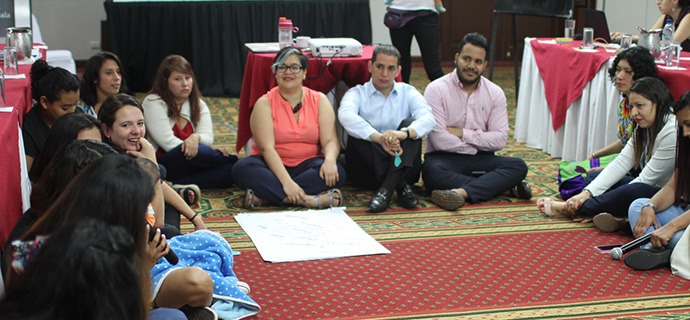
Perla Vázquez leading a workshop at the Latin American Regional Youth Convention to Prevent Early Unions, held in Guatemala, March 2018. Photo provided by The Seattle International Foundation.
While other countries and continents struggle to end forced marriages of young girls, the majority of early marriages in Latin America happen when a young woman is between 14 and 17 years old. Vázquez said this is unique to the region culturally because it happens at all class levels—in rich and poor communities—and in countries that might have laws prohibiting marriage before the age of 18. It is also easy in some communities to lie about a young woman’s age in order to marry her off.
“It is very complex,” she said. “For example, in Guatemala it is forbidden for a person to get married before the age of 18, but that does not limit the cultural practice of getting married sooner, especially in communities with more corruption.”
In some indigenous communities in Central America, there are two sets of law in play, as well, Vázquez said, and while national law might prohibit marriage before the age of 18, local law might not.
Often when a marriage is forced, the young woman is seen as a part of a trade agreement or a commodity exchanged by families, both rich and poor.
“The structural problem in the society is that women are seen as objects without rights,” Vázquez said.
Many forced marriages in this region are between young teenaged girls and much older men. For example, a 15-year-old could be married off to a 25 or 35-year-old. This is seen as a cultural norm in some places, Vázquez said, and some groups that CAMY Fund supports work in these communities to challenge these norms by educating young women and men about women’s rights, especially in marriage. The work is vast, as education for parents and men (especially in schools) does not promote women’s rights or feminism. Recent studies in Guatemala show that educated men still prefer wives who are much younger than they are, continuing the cycle of young women being married off well before they have an opportunity to see if they want to pursue other options.
“We have been working on child marriage through different approaches because it is really the responsibility of the parents and the adults—not the young people,” Vázquez said.
Adults need to be willing to have conversations as well as educate their families in order to keep young women from marrying young. One group funded by CAMY in Nicaragua, Fundación Mujer y Desarrollo Económico Comunitario (The Foundation for Women and Community Economic Development), works with mothers and daughters to educate and improve relationships, as well as to break culturally held beliefs that marriage is the only option for their daughters.
“This process in Nicaragua was very, very interesting because they discovered the importance for both mothers and their daughters to understand that their daughters can decide their futures,” Vázquez said.
Education is a central tenant of many of the organizations that CAMY funds, with social media campaigns and websites in Spanish and Portuguese that local communities can read and understand about reproductive and sexual health. Vázquez said that changing how men think about marriage and women is also important to ending young marriage in Latin America. The patriarchal portrayal of marriage can be damaging, Vázquez said, especially to women who are subjected to violence or abuse if a man uses the marriage as a way to exert power.
“I think it is very complex in Latin America,” Vázquez said. “We need to change the perspective of love and couples, especially the role of men.”
While the work never stops, progress is possible. Last year, CAMY and other organizations pushed for research in Latin America that took a feminist approach. For Vázquez, this is part of her everyday work, as she travels internationally, sharing the methods and research from groups that CAMY funds, as well as presenting the strategies that local youth-focused and youth-led groups use to bring about change. Ultimately, the work comes down to young women learning from a young age that their bodies are their own.
“They can take possession of their own bodies, and they can decide whether or not they want to be romantically involved with someone,” she said. “That is not something that the family can decide. Women do not belong to their families; they are not objects to be exchanged.”
Welcome New Members
Please welcome our newest Global Washington members. Take a moment to familiarize yourself with their work and consider opportunities for support and collaboration!
Hunger Project
The Hunger Project is an organization committed to the sustainable end of world hunger. It has ongoing programs in Africa, Asia and Latin America, where it implements programs aimed at mobilizing rural grassroots communities to achieve sustainable progress in health, education, nutrition and family income. thp.org
Yemen Relief and Reconstruction Foundation
The Yemen Relief and Reconstruction Foundation’s aims to increase awareness of the US public and policymakers vis-a-vis the humanitarian crises underway in Yemen, and support relief and reconstruction, while facilitating peace campaigns. yemenfoundation.org
Member Events
March 14 Landesa // Seed the Change
March 19 Splash // Informal update on Project WISE (WASH-in-Schools for Everyone). Email viri@splash.org to RSVP.
March 28 World Affairs Council // Fulbright Talks: Stories by Fulbrighters
Career Center
Supervising Attorney – Special Programs Kids in Need of Defense (KIND)
Strategy Consultant – Africa Malaria No More
Associate Partner Dalberg
Manager, Business Operations Capria
Check out the GlobalWA Job Board for the latest openings.
GlobalWA Events
March 17 Climate Change in the Global South – What can funders and their community partners do?
March 21 Networking Happy Hour with Friends of GlobalWA, WGHA, and World Affairs Council
March 27 Vowing to End Child Marriage by 2030
March 28 Fighting Extremism in Fragile States: From Crisis Response to Prevention
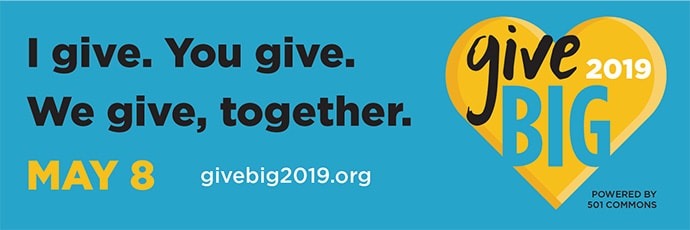
Don’t miss your chance to attract new donors to support your organization. The deadline to register for GiveBIG is Friday March 29. By that day you also need to have paid your registration fees or you will not be able to participate. GiveBIG raised $16,500,000 last year. It is easy to register and once you are registered you can participate for free in the GiveBIG fundraising trainings with Ariel Glassman from Ostara. 501 Commons is also providing Fundraising Accelerator to help you mount a successful campaign. Every two weeks 501 Commons will send you specific actions you can take to prepare for GiveBIG.
Mark Your Calendar
- March 29: Registration deadline for all new and returning nonprofits
- April 19: Last day for profile changes
- April 23: Early Giving begins
- April 28: Seattle Times Giving Guide published
- May 7: Early Giving ends
- May 8: GiveBIG!
If you have questions or need assistance contact 501 Commons by phone at 1-833-962-3615 or by email at givebig@501commons.org